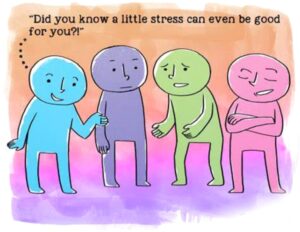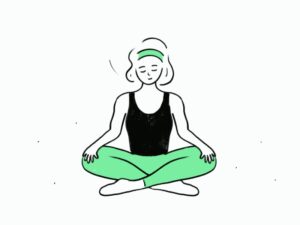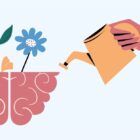Wendy Suzuki, a neuroscientist claims that anxiety can improve quality of life by ‘Supercharging’ brains and bodies.

Anxiety can be a useful emotion. It is a way for the body to protect itself when it senses a threatening situation. For the most part, anxiety – which could range from that ‘butterflies-in-the-belly’ feeling before an interview to ‘full-blown disorder’is seen as a highly negative emotional state, one that clouds judgement and impacts peace of mind.
We think about anxiety as negative because it is often associated only with the pessimistic, uneasy, disturbing feelings that leave us with a sense of not being in control. Opening our minds to a ‘more objective, accurate and complete understanding of the underlying neurobiological processes’ can help create positive changes to the anxiety state itself.

So, what is this ‘Good Anxiety’? How do we channel this to charge our brain and body? That is becoming more functional and reach a more fulfilling level.
Everyone has a baseline level of anxiety and it can help in daily functioning of an individual in a healthy manner. For instance, anxiety gets us out of bed, knowing there are things to be done. So, a certain amount of anxiety is often required to keep self-motivated.
Anxiety serves as a warning sign for us- the discomfort is an immediate alert of sorts. It helps us anticipate the dangers and threats. Fear of the consequences will also ensure that you do everything possible to rise to the occasion. So, some amount of anxiety is ‘Okay’!
Anxiety causes an ‘adrenaline rush’, often called ‘fight or flight or stress hormone’, to register the urgency and send a signal through your body, preparing it to take on a situation.
Neuroscientists say that, everyday anxiety can be managed, even channeled by what is known in academic circles as ‘neuroplasticity’- getting the brain to change and adapt to new situations.

How can we Consciously channel anxiety in a healthier manner?
This can be done by consciously intervening by making lifestyle changes- practicing to be in the ‘present’, the ‘here & now’, eating healthier & exercising to recalibrate the neutral pathways associated with anxiety. ‘It starts with awareness’. The body gives you signals, and adding deep introspection to it is needed for management.
Some of the many techniques a therapist often uses in therapy to facilitate a client’s journey are:
⦁ Writing about feelings.
⦁ Journaling for introspection.
⦁ Cognitive Re-framing, that is reframing un-helpful thought patterns.
⦁ Diaphragmatic Breathing
⦁ Sound & Resonance Therapy
⦁ Havening techniques

There are certain blanket measures, that one can use to channel anxiety by self:
⦁ Exploring & investing in hobbies.
⦁ Exercising, which releases endorphins & aids better sleep
⦁ Bringing structure to your day/ Scheduling your day
⦁ Adapting healthy eating habits
⦁ Spending quality time with family, friends & pets
⦁ Digital detoxes, that is indulge in activities that do not involve gadgets.
⦁ Spend time in nature, the greens and blues are a natural soother to our system
⦁ Art, it can help externalize your feelings
⦁ Music, that helps you soothe your nerves
So, perhaps next time you notice the heat of anxiety ripple through your mind and body, you may be able to remind yourself of this sentiment, asking: what is it that anxiety is trying to teach me? How can I channel it better?
There is a difference between channeling anxiety and dealing with more extreme conditions like generalized anxiety disorders (GAD), panic disorders, phobias or obsessive-compulsive disorder (OCD). Anxiety becomes a problem when it begins interfering with daily life. If you have an anxiety issue, you should seek support from a mental health professional. A professional will facilitate you channelizing your anxiety, equip you to deal with appropriately.
If you or someone you know is struggling, you can reach out to our mental health experts at info@sfct.in




Recent Comments